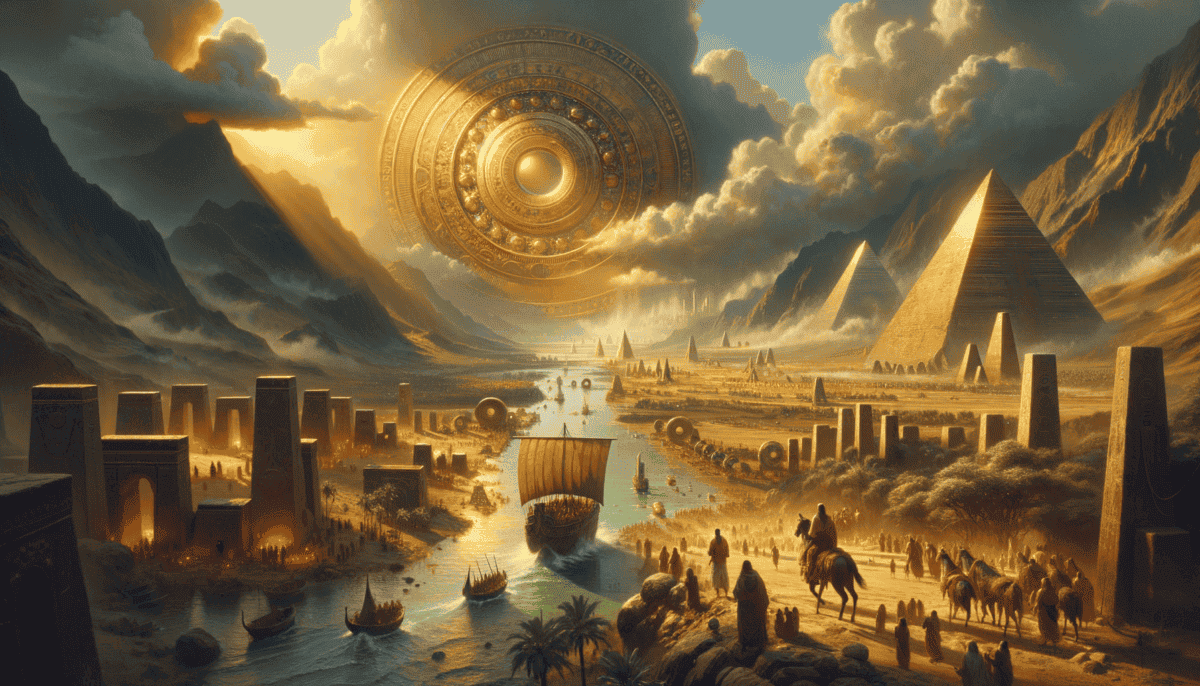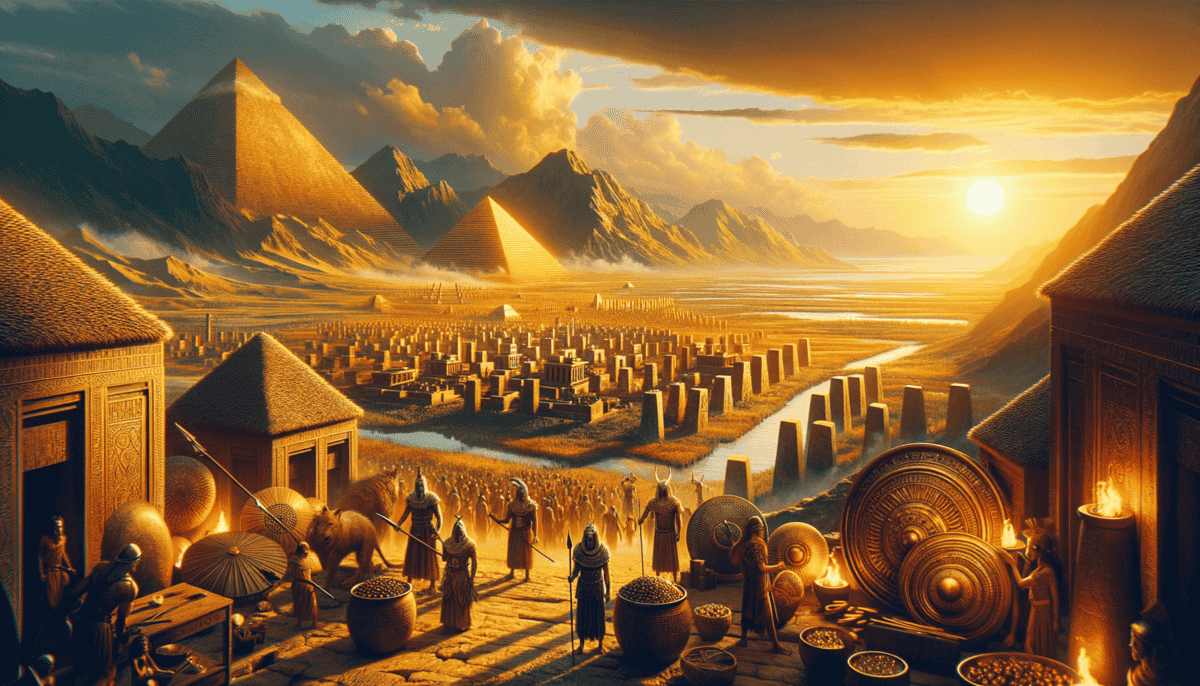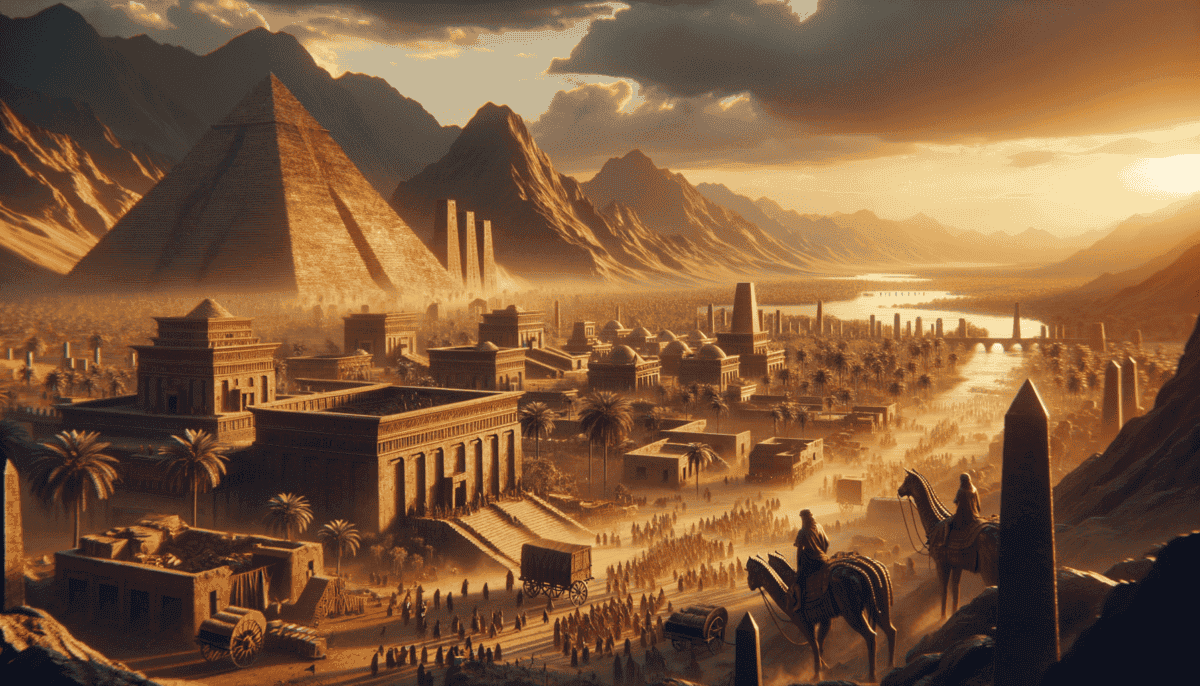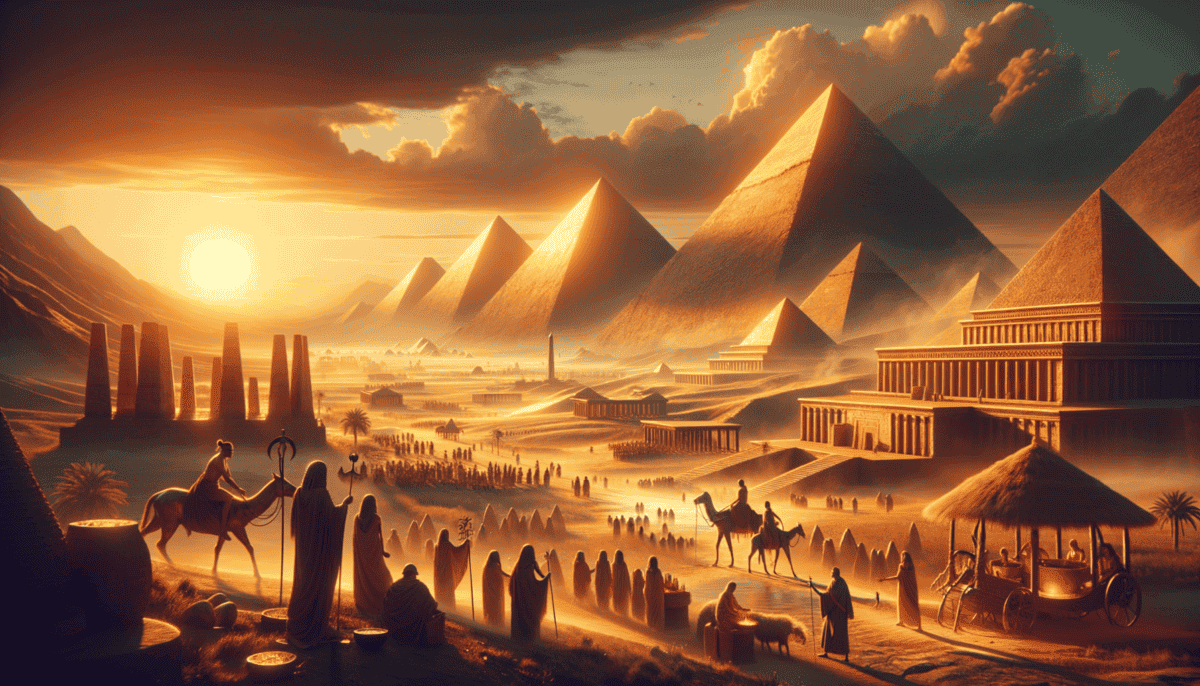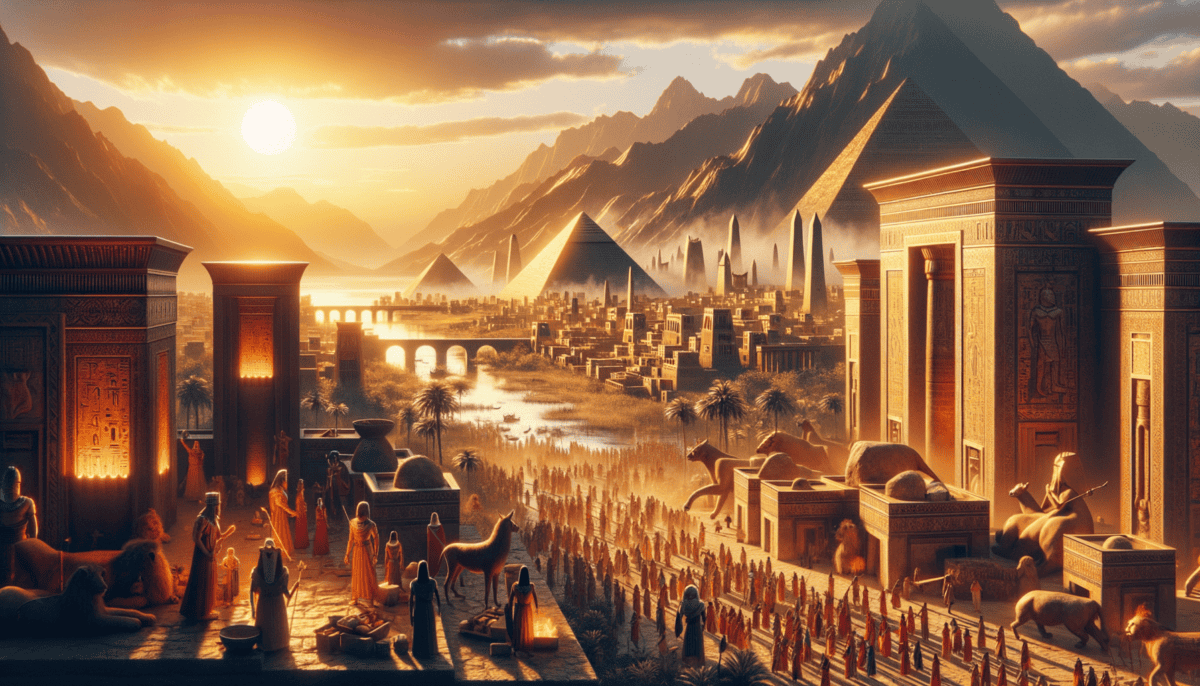The Metal Makers
Adapa wiped the sweat from his forehead as he watched his father work at the hot furnace. The orange flames danced and crackled, making shadows on the mud-brick walls of their workshop. It was another warm day in their village along the great river, just like it had been for countless seasons before.
"Come closer, son," his father Enlil called out, his voice carrying over the whoosh of the bellows. "Today you'll learn our family's special way of making bronze."
Adapa's eyes lit up with excitement. At twelve summers old, he had been waiting for this moment. His family were known as the best metal makers in all of Sumer.
"First, we need copper," Enlil explained, pointing to the reddish rocks piled nearby. "And this greenish stone – we call it tin. When we mix them just right in the fire…" He grinned at his son. "Magic happens!"
The workshop grew even hotter as Enlil added more fuel to the furnace
"But father," Adapa asked, "why mix the metals? Isn't copper good enough by itself?"
Enlil shook his head. "Watch and learn, my curious boy."
He pulled out two metal tools – one made of copper, one made of bronze. With a strong strike, he bent the copper tool easily. But the bronze one stayed straight and strong.
"See? Bronze is harder than copper alone. That's why everyone wants our bronze tools and weapons. It's changing how we farm, build, and protect ourselves."
Adapa moved closer, fascinated by the molten metal glowing in the clay crucible. The mixture bubbled and swirled like liquid sunlight.
"Your grandfather discovered this special mix," Enlil continued proudly. "He noticed that certain green rocks made the copper stronger. Now our whole village benefits from his wisdom."
Outside the workshop, Adapa could hear the busy sounds of village life – farmers with their bronze plows, builders with bronze chisels, and traders arguing over prices in the marketplace.
"Can I try mixing the metals?" Adapa asked eagerly.
"Soon," his father promised. "But first you must learn to read the fire, to know when the metal is ready. It takes years of practice to get it just right."
That evening, as the sun set over the river, Adapa helped his father pour the molten bronze into clay molds. They were making tools for the farmers – strong bronze hoes that would help grow more food for their growing village.
"One day," Enlil said, placing a hand on Adapa's shoulder, "you'll be the master metalworker here. Our knowledge will live on through you."
Adapa nodded solemnly. He knew their bronze-making skills were precious – a gift from the gods that had to be protected and passed down carefully.
As the metal cooled and hardened, Adapa imagined all the amazing things he would make someday. Bronze tools, weapons, and beautiful objects that would last for generations. Maybe he would even discover new secrets about metal-making, just like his grandfather did.
Little did Adapa know that his family's bronze-working skills would help build one of the greatest civilizations the world had ever seen. But that's a story for another day…
The Traders’ Path
The morning sun had barely risen when Mira loaded the last bronze tools onto her father’s trade cart. Their donkeys stomped impatiently, ready to begin the long journey ahead.
“Are you sure you want to come along?” her father Jabari asked, securing the precious cargo. “The trade route is long and dangerous.”
“Yes, Father! I want to see the distant cities you always talk about,” Mira replied with determination in her voice. At thirteen, this would be her first big trading journey.
Their caravan joined other traders at the city gates. There were people from many lands – some with dark skin like Mira’s family, others with lighter complexions and different clothes.
“Remember,” Jabari told Mira, “a good trader must know not just goods, but people too. Every city has its own ways.”
The journey was exciting! They crossed hot deserts where the sun burned bright ☀️ and traveled through green valleys where rivers flowed strong . At night, the traders shared stories around campfires.
“Tell us about your city,” a trader from the north asked Mira one evening.
Mira described her home proudly. “Our bronze makers are the best! That’s why we carry their tools to trade. What do you bring from your land?”
“Tin from the mountains,” he answered, showing her some greenish stones. “Without our tin, your bronze makers couldn’t make their tools!”
Each city they visited was different and amazing:
- One had tall buildings made of sun-dried bricks
- Another sat by the sea with busy boats coming and going
- Some had strange foods Mira had never tasted
- Others had people speaking languages she didn’t understand
At the coastal city, Mira saw something that took her breath away – huge wooden ships!
“Those are trading ships,” her father explained. “They carry goods across the great waters, much farther than our donkey carts can go.”
In every city, Jabari traded their bronze tools for different things:
– Shiny shells from the sea
– Soft wool from mountain sheep
– Sweet-smelling spices from distant lands
But trading wasn’t always easy. One day, rough-looking men stopped their caravan.
“Bandits!” someone shouted. But Jabari stepped forward calmly.
“Friends,” he said, offering them food and small gifts. “The trade routes belong to everyone. Let us help each other instead of fighting.”
The bandits, surprised by his kindness, ended up helping them find water in the desert!
After many weeks, they began the journey home. Their cart was now full of treasures from far-off places.
“You were right, Father,” Mira said as their city walls came into view. “Trading is about more than just swapping things. It’s about connecting people.”
Jabari smiled. “And now you know why I love being a trader. Every journey teaches us something new about our big, wonderful world.”
That night, as Mira helped unpack their traded goods, she dreamed about all the new journeys ahead. What other amazing places and people would she discover on the traders’ path?
The Rising Walls
The sun beat down on the bustling streets of Ur, where Adad watched workers stack sun-dried bricks higher and higher. The city walls were growing taller every day! ️
“Why do we need such big walls, Uncle Enlil?” Adad asked, tugging at his uncle’s sleeve. Enlil was the city’s master builder.
“Our city is growing, little one,” Enlil smiled, pointing to the busy streets below. “More people means we need more protection.”
From their spot on the half-built wall, Adad could see the whole city spread out like a giant puzzle. The zigzag temple in the center reached toward the sky. Around it, houses and workshops crowded together like a family of mud-brick boxes.
“Look there!” Enlil pointed to different parts of the city:
- The busy marketplace where traders sold goods ️
- The temple where priests kept important records
- The craftsmen’s quarter where bronze workers made tools ⚒️
- The grand houses where rich merchants lived
Suddenly, horns blasted from the watchtower!
“Raiders!” the guards shouted. “Everyone inside the walls!”
Adad watched as farmers rushed through the city gates with their animals. Market sellers grabbed their goods. Soon everyone was safely inside.
The raiders took one look at the tall walls and turned away. They couldn’t climb such high walls!
“See?” Enlil said proudly. “This is why we build strong walls.”
Later that day, Adad visited his friend Ninu, whose father was a temple scribe. They watched him press shapes into soft clay tablets.
“What are you writing?” Adad asked.
“Recording how much grain each farmer brought to the temple,” Ninu’s father explained. “In a big city, we must keep track of everything.”
That evening, something special was happening. The city’s leaders gathered in the grand meeting hall. Adad and Ninu sneaked close to listen.
“The city is getting too crowded,” one leader said. “We need better ways to share water.”
“And we must build more grain storage,” another added.
The king stood up. “Then let’s make new rules. Every family will help dig water channels. And we’ll build bigger granaries.”
The next morning, Adad helped his uncle measure spaces for new buildings. They used bronze tools to mark straight lines in the dirt.
“Cities are like living things,” Enlil said. “They grow and change. Each new building, each new person makes our city stronger.”
But not everyone was happy about the changes. Some people argued about the new rules.
“Change is hard,” Enlil explained. “But look how far we’ve come! Our grandparents lived in small villages. Now we have this mighty city!”
That night, Adad sat on the wall again, watching torches light up the streets below. He could hear music from the temple, laughter from homes, and the quiet talk of guards walking their rounds.
“Our city is like a big family,” he told Ninu. “Sometimes we argue, but we work together to make things better.”
As stars appeared above the city walls, Adad wondered what new changes tomorrow would bring to their growing city. What amazing things would they build next?
Swords and Shields
The clash of metal rang through the training yard. Kash watched in awe as bronze swords flashed in the morning sun. ⚔️
“These weapons are different from the old copper ones,” his father Meren said. As the army’s master weaponsmith, he knew everything about making battle gear.
“Why are they better, Father?” Kash picked up a bronze dagger, feeling its weight.
“Watch this,” Meren demonstrated. He took two swords – one copper, one bronze. With a swift motion, he struck them together. The copper blade bent, but the bronze stayed straight.
“Bronze is special,” Meren explained. “It’s like magic metal. Mix tin with copper, and it becomes super strong!”
“The gods blessed us with this knowledge,” the old warrior Akil said, joining them. “Now we can better protect our people.” ️
Suddenly, drums echoed from the city walls. Everyone froze.
“Ships!” came the cry. “Strange ships in the harbor!”
Kash and Meren rushed to the walls. Far below, weird-looking boats approached the docks. Their sails were different from any they’d seen before.
“Those are Sea People ships,” Akil growled. “They raid cities all along the coast.”
The city burst into action:
- Soldiers grabbed their bronze armor and weapons ️
- Families hurried inside their homes
- Merchants rushed to protect their goods ️
- Guards took positions on the walls
In his workshop, Meren worked faster than ever. “Quick, Kash! Help me hand out these weapons!”
They distributed sharp bronze swords, strong shields, and shiny helmets to the soldiers. Each piece had been carefully made in their family forge.
The Sea People landed their ships and charged toward the city. But they didn’t expect what waited for them.
The city’s army stood ready. Their bronze weapons gleamed. Their shields formed a strong wall.
“See how our bronze scares them?” Akil smiled. “They’ve never faced warriors so well-armed!”
The battle was short. The raiders couldn’t break through the city’s defenses. They retreated to their ships and sailed away.
That evening, the city celebrated. Kash watched proud soldiers showing off their bronze gear.
“Our weapons protected us,” one warrior said, “but it was working together that won the day.”
Later, in the workshop, Meren taught Kash more about making weapons.
“Remember,” he said, “these tools can protect or harm. A good weaponsmith thinks about both.”
That night, under the stars, Kash thought about what he’d learned. Strong weapons could keep people safe. But the strongest weapon was people working together.
“Will you teach me to make bronze weapons?” Kash asked his father the next morning.
Meren smiled. “Yes, but first you must learn about peace. The best warriors know when not to fight.”
As they worked that day, mixing copper and tin into strong bronze, Kash wondered about the future. What new ways would they find to use this amazing metal? And how would it change their world?
Sacred Metal, Sacred Stories
The temple bells rang out across the city at sunrise. Kash followed his father Meren up the great stone steps. Today was special – they would help make bronze offerings for the gods. ✨
“The gods taught us how to make bronze,” the high priestess Inanna said, her gold bracelets jingling. “Each piece we create honors their wisdom.”
Inside the temple, fires burned in sacred braziers. The air smelled sweet with incense. Priests sang old songs about the metal-working gods.
“What are we making today?” Kash asked, watching his father set up their tools.
“A special bull statue,” Meren smiled. “Bulls are strong, like bronze. They show the gods’ power.”
“When we shape the metal,” Inanna explained, “we shape stories that will last forever.”
As they worked, other people brought offerings to the temple:
- Farmers with grain and fruits
- Weavers with colorful cloth
- Hunters with animal skins
- Musicians with songs and dances
Meren taught Kash how to pour the hot bronze into clay molds. “Each bubble must be gone,” he said. “The gods notice every detail.”
While they waited for the bronze to cool, Inanna told stories. She spoke of the first metalworkers, blessed by the gods with secret knowledge.
“Look!” Kash pointed to the temple walls. “The pictures show the stories!”
Colorful paintings covered the walls. They showed gods teaching humans to make metal, build cities, and grow food.
“Yes,” Inanna nodded. “Our art tells our history. Bronze helps us remember.”
When they broke open the molds, a beautiful bull emerged. Its bronze surface shone like magic.
“Now we must bless it,” Inanna said. She sprinkled sacred water on the statue while singing an ancient song.
Suddenly, sunlight streamed through the temple window. It made the bronze bull glow golden.
“The gods are pleased,” Inanna smiled. “They welcome our offering.”
That evening, dancers performed in the temple courtyard. Their bronze jewelry sparkled in the firelight.
“Bronze isn’t just for weapons,” Meren told Kash. “It helps us talk to the gods, make beautiful things, and share our stories.”
As night fell, priests placed the bull statue on the temple altar. Its eyes seemed to watch over everyone.
“Will you teach me to make beautiful things too?” Kash asked his father.
“Of course,” Meren replied. “Beauty and strength go together in bronze.”
Walking home under the stars, Kash thought about all the ways bronze connected people – to each other, to their past, and to their gods.
Tomorrow would bring new stories to tell and new treasures to create. But tonight, the bronze bull watched over the city, a bridge between earth and sky.
The Bronze Age Ends, New Stories Begin
Dark clouds gathered over the city. The bronze workshops were quiet now. Kash, now grown, watched as people packed their belongings. ️
“Why are so many leaving, Father?” Kash asked Meren, who looked older and worried.
“The rains didn’t come this year,” Meren said. “And traders bring news of trouble in other cities.”
The marketplace that once buzzed with life was half-empty. Fewer traders came with tin for bronze-making.
“Remember the stories Inanna told?” Kash asked. “About cities that rose and fell before ours?”
“Yes,” Meren nodded. “Everything changes. But people always find new ways to live.”
In the quiet workshop, they gathered their precious tools. Each one held memories:
- The hammer that shaped the temple bull
- The molds that made warrior swords ⚔️
- The special bowl for mixing copper and tin
- The tools that taught Kash his craft ️
A group of children played nearby, using pieces of old bronze to make up stories. They didn’t know their world was changing.
“Look how they play,” Kash smiled. “They remind me that new stories always begin.”
News came from travelers about a strange new metal called iron. It was harder than bronze but needed different skills to make.
Kash watched his young son playing with iron rocks. “Maybe he’ll learn to work this new metal,” he thought.
“The future belongs to the children,” Meren said wisely. “They will make their own wonders.”
That night, the family gathered to tell stories. They remembered:
The first bronze tools their ancestors made
The great trading ships that crossed seas
The mighty cities that reached to the sky
The beautiful art that honored the gods
As they packed to leave their old home, Kash kept one special thing – the small bronze bull he had helped make in the temple years ago.
“This will remind us,” he told his son. “Bronze gave us so many gifts.”
Together, they walked toward the rising sun. Behind them, the old bronze workshops stood quiet. But ahead, new adventures waited.
Kash squeezed his son’s hand. “We carry our knowledge with us,” he said. “And we will build again.”
The Bronze Age was ending. But the story of people making wonderful things had only begun. Iron tools would build new cities. New metals would shape new dreams.
And somewhere, a child would look at an old bronze bull and ask, “Tell me the story of how this was made.”
The greatest gift of the Bronze Age wasn’t the metal itself. It was learning that people could change the world with their hands and hearts.
That lesson would shine forever, bright as polished bronze in the morning sun.


